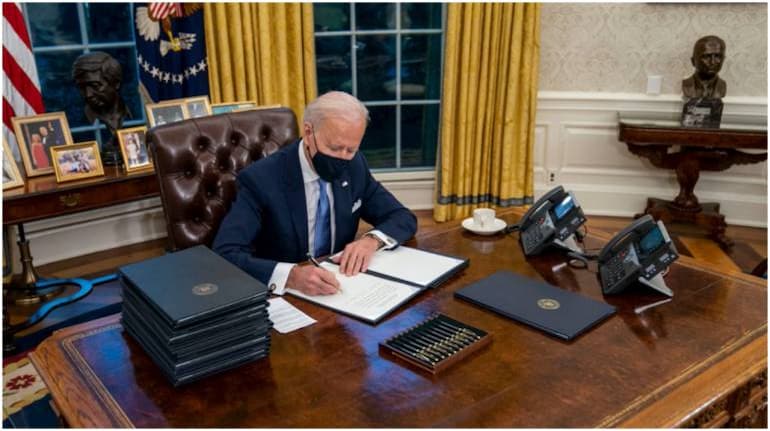



Some time in 2012, social media did what social media does best - parodied and memed then President Barack Obama’s rendition of Carly Rae Jensen’s “Call Me Maybe.
The song was a pop sensation with prosaic lyrics, but kept regurgitating the title of the song, “call me, maybe” -- clearly a phone call meant a lot.
Dating to 2021 (no pun intended), but just like the millennial protagonist in the song, waiting for a call from a heartthrob, geopolitically all world leaders wait with equal anxiety and a sense of nervous optimism for the call from the Oval office, especially after a new President has been inaugurated.
President Joe Biden fielded congratulatory phone calls since November, post the elections, however a sense of schizophrenia ensued from some world leaders exacerbated by Donald Trump’s refusal to concede.
Come late January, that was a different story. President Biden reached out to his counterparts across the globe. Traditionally, the first calls do go to the closest allies, despite Biden’s predecessor making an unusual list of choices (breaking protocol and reaching out to Taiwan).
For Tel Aviv, or Jerusalem if you’re in the Knesset, that call didn’t come as expected. Instead, President Biden’s calls went along Trans-Atlantic lines to Canada, Mexico, the UK, France, Germany and even Russia.
I have long argued that India-US relations don’t keep policymakers in Washington up at night, as boring, safe and stable countries (in the diplomatic sense) don’t fall under the “CRIMEAN” outlook for US policy makers. I acronymized it as C for China, R for Russia, I for Iran, ME for Middle East, A for Afghanistan and N for North Korea. In the sense, troubled, contentious regions and countries that are either at geopolitical crosshairs with Washington or need Foggy Bottom’s considerable attention.
But surprisingly, it wasn’t just Bibi (Netanyahu), even other leaders in the Middle East didn’t receive the immediate call from the Executive Branch of the US government. This was an aberration from Biden’s predecessors, for even Trump and his predecessor Obama had dialled Bibi.
A new Biden administration has signalled to the world that America will no longer be insular as evinced in the previous four years, but his current calls tell us that Washington’s current priorities lie in repairing relations with neighbours and European allies that Trump had jettisoned, particularly given the vitriol towards NATO.
Ironically, his calls with his North American counterparts were more to assuage feelings, given Canadian PM Trudeau has been vocal over his disappointment over Biden’s move to cancel the controversial Keystone XL pipeline, something that President Trump had signed off on.
Despite Trump’s bellicosity towards Mexico on immigration (enter Border Wall), Mexico’s Andrés Manuel López Obrador or “AMLO” had somehow developed a bonhomie with Trump. Biden’s call was an attempt to discuss key issues pertaining to trade (given how Trump eviscerated NAFTA) and immigration.
In the context of the Asian century, it seems strange that Biden has reset the clock to focusing on Trans-Atlantic relations, as evident in his calls to Boris Johnson, Emmanuel Macron and Angela Merkel soon after speaking to his North American neighbours. But the call with NATO Secretary-General Jens Stoltenberg adds to the method in the alleged madness.
Biden’s foreign policy 101 is not just based on outreach after insularity, but pledged on mending bruised wounds and broken fences in Europe with regard to American apathy towards NATO as displayed by Trump. Biden’s agenda as stated is to “rebuild and re-establish our alliances, starting with NATO” and add reassurance of Washington’s commitment to European security.
And when there is NATO, there is Russia, as the Trans-Atlantic pact has long acted as a bulwark against any perceived or actual belligerence from the Kremlin. For reasons unclear, Biden’s predecessor had an affinity for strongmen and Putin seemed to rank in the higher echelons of those favourites. Biden broached the Aleksey Navalny imbroglio, a name that Putin reviles ad-nauseum, while not mincing his words on Russian interference through cyber espionage. There seems to be little to no olive branch growing between the White House and the Kremlin, as the Biden administration remains firmly committed to national security in the face of perceived Russian aggression.
With China, Biden will follow a policy of small yard, high fence, which essentially describes that Biden will not go down the road of Trump’s bellicosity starting trade wars, and there will be room for economic engagement but with severe caveats of security. Trust Chinese companies (read TikTok) and others to face a pushback on the basis of national security concerns.
If the phone calls are a harbinger, then Biden’s foreign policy epitomises a concerted push towards trade, reassuring American allies that the US hiatus from global engagement was merely an aberration and not a seminal moment of transition from the Washington doctrine. Apart from trade, there is the message of immigration with neighbours, and non-compromising postures of national security with Russia and China.
An oft-stated meme about NATO was that the acronym stood for “No Action, Talk Only”, alluding to the organization’s anachronistic outlook in the wake of the demise of the Soviet Union and subsequent end of the Cold War. But President Biden’s call to NATO General Secretary debunked that meme stating that Biden was keen on engagement with an organisation that was unwillingly left out in Washington’s priority list during the past four years.
Discover the latest Business News, Sensex, and Nifty updates. Obtain Personal Finance insights, tax queries, and expert opinions on Moneycontrol or download the Moneycontrol App to stay updated!
Find the best of Al News in one place, specially curated for you every weekend.
Stay on top of the latest tech trends and biggest startup news.